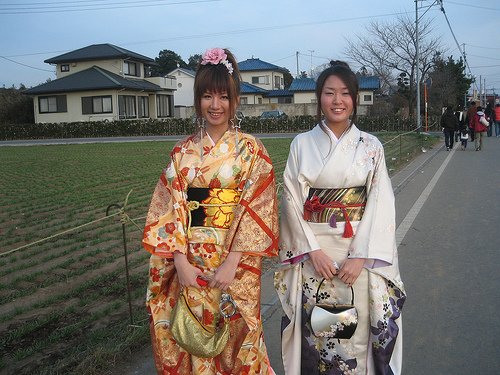One of the cool things about teaching ESL in Japan was learning my own language and its grammar. Language is based on rules which are internalized by speakers of that language, and part of the reason why New Jersey English or Osaka Japanese sounds odd to people who aren’t from those places is, speakers from those areas are using a slightly different set of internal rules. Although we all learn some grammar in school (does everyone remember creating sentence diagrams?), the only way to really learn something is to teach it, to stand in the middle of a classroom with students who are each struggling with a different problem area and find a way to help them. After letting my students down by saying “uh, sure, I guess that sounds right” a few times (Japanese students hate teachers who do that), I buckled down and learned how to teach grammar. Did you know the difference between “the” (rhyming with “three”) and “the” (rhyming with “uh”)? The first is used before words starting with vowels (“thee end”) and the latter before all other words (“thuh dog”), although it was news to me at the time. What do you do when a student asks why you have to say “a piece of chalk” when it’s clearly something you could count like a pen or pencil. Or why pants and glasses are “pairs” when you can’t separate them? Or why can we count fish individually, but the meat of a fish is non-count? Or why words like “sky” and “sea” appear plural sometimes (e.g. “the Friendly Skies” or “the seven seas”)? One rule of English that threw me at the time was the long list of words with different intonations depending on whether they’re being used as nouns or verbs (e.g. research the research, permit the fishing permit, present a present to someone, or rebel against the rebel base). Surprisingly, living in a foreign country has put me more in touch with my native language.
The Japanese learn a lot of English, six years if they graduate from high school and up to ten years if they attend a four-year university. Despite this, most Japanese don’t really get that good at communicating in English for several reasons, including Japan’s isolated position in the world (when 99% of the people around you are Japanese, there’s not a lot of opportunity to practice) and the fact that English lessons are generally taught in Japanese for the exclusive purpose of passing tests. But just because the Japanese aren’t generally fluent in the language doesn’t mean there isn’t a wealth of English phrases used on a daily basis here. When it’s time for me to spell my wife at helping our son with his homework, for example, I’ll say “baton touch” as I sit down, a common phrase used when taking over a duty. If my kids misbehave in public I remind them to think about the “TPO” (“time, place, occasion,” although my son says it means “toilet paper office”). Anime fans know that when something good happens to a character, they’re liable to shout “Lucky!” (LEH-kee!). When we go for a drive up in the mountains, we take the “I.C.” (interchange, or freeway on-ramp), and when we get hungry we stop at a “P.A.” (parking area) to eat. Some “English” words used here are downright unintelligible to native speakers, like “don-mai” (DOHN-my) which means “don’t worry about it” and comes from “don’t mind,” or “back-ourai” (back-OH-rai), meaning “it’s okay to back up a little further,” from “back-alright.”
There comes a time in the life of every gaijin when he or she inevitably encounters chopsticks, those devilish tools used for eating in most of Asia. Japanese people use chopsticks for nearly every meal, except for Western dishes like pasta and curry. Along with hiragana and the ABC’s, learning to use chopsticks is something kids are taught by their parents at around the age of two or three, although some children still have yet to master chopstick use by the time they start preschool. This being Japan, it is exactly one “right” way to hold chopsticks, and it’s not uncommon for a group of people to start critiquing the chopstick use of someone in the group. Foreigners living in Japan know that using chopsticks in public is cause for praise from older Japanese, although please note that countering by complimenting their use of a knife and fork is not generally appreciated. Although they’re hard for Westerners to get used to at first, chopsticks are very easy to use, and when you master them it’s not hard to pick that last grain of rice out of your bowl quite deftly. Incidentally, J-List carries a wide variety of chopsticks, from ones with rough patches at the tips for easy gripping of food to higher-end chopsticks that are a joy to hold and use, and even disposable chopsticks that are handy to have in the kitchen.
Do you have a website or blog? Would you like to help J-List brings its brand of Japanese pop culture to the world and get something back from us? If so, then we hope you’ll join the Friends of J-List Affiliate Program, a cool system that lets you link to J-List products and receive commissions as cash or store credit (your option). Our system regularly receives praise from new members for being very easy to use, and since we host all graphics ourselves, there’s not even any bandwidth cost to you. You can link to any product, category or search string on either the J-List or JBOX.com websites, with total control over what you show your readers. Effectively immediately, we’re raising the commissions we pay, making this an even better opportunity for you to help others find J-List. See this page for more info and a link to join up!
This month’s “H-Game of the Month” is one of my own favorites, Snow Drop, a dramatic story-centric PC dating-sim game by Will and female Japanese illustrator Shikage Nagi (who also created Little My Maid). A great game set in a winter wonderland, you play the sensitive Minoru, caught in a love triangle between your childhood friend Kyoka and a mysterious girl named Shizuka, who you’re sure you’ve met before even though you can’t remember her. What about the experienced Keika who keeps trying to get you to comfort her, or your troublesome younger sister? And what is the mysterious destiny that waits for you in the snowy Japanese mountains? Available at a great price this month only!
















